LAODICEA
(DENİZLİ CİTY, GONCALI AND ESKİHİSAR VİLLAGE)
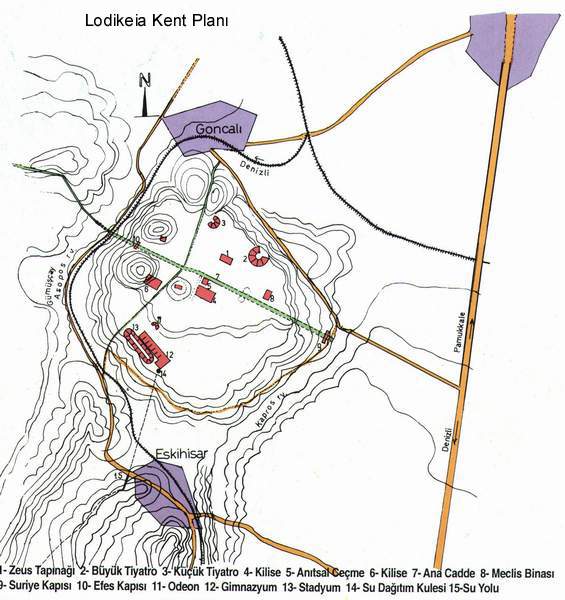
Laodicea City Plan
1-)Zeus Temple 2-)Big Theatre 3-)Small
Theatre 4-)Church 5-)Monumental Fountain
6-) Church 7-) Main Street 8-)
Assembly Building 9-) Syira Gate 10-)
Ephesus Gate 11-) Odeon 12-)Gymnasium
13-) Stadium 14-)Water Delivery
Tower 15-)Aqueduct
|
Archaic
Laodicea city that is 6 km north of Denizli Province is established at a very suitable
point in geographical point of view and in the south of Lykos river. The name of the city
is mostly referred to as "Laodicea" at the side of Lykos" in the archaic
references. In accordance with the historian Plinius, Laodicea has been constructed on the
ruins of a village that was first called as Diospolis "City of Zeus" and then as
Rhoas. The name Diospolis is the symbol of the importance given to Zeus cult there. The
name Rhoas may belong to any of the native Anatolian languages.
In accordance with other archaic sources, the city has been established
by Antiokhos 2nd between the years 263 - 261 BC and the name of Antiokhos's wife,
Laodicea, has been given to the city. Laodikeia is one of the most important and famous
cities of Anatolia in the 1st century BC. The big artistic works in the city belong to
this period and the gladiator fights have made the city become more important. |
The
Romans have given a special importance to Laodikeia. Famous statesman and preacher Cicerot
has come to this city in 50 BC and has dealt with some legal problems of the city. Again
at those dates, the Romans have made Laodikeia the center of Kibyra conventus.The Roman
Emperor Hadrianus has visited the city in 129 AD and has written letters to Rome from
there.
Another evidence showing how good the relations between the City and
Rome were is the status, wealth and priviliges that Zenon family had. A man named Polemon
from this family has been assigned as a director to Kilikia and Pontus by Antonius. |
Monumental Fountain
It is located at the corner of the main street and secondary street of the city. It is
made so as to have two sides. It has niches. It has been repaired in Byzantine Period.
The inscriptions and coins provide information about the religious life
of Laodikeia. Zeus Laodiokos figure seen on many coins belonging to the Empire period is
the indication of the importance given to Zeus cult in this city. The information we have
in relation with the late periods of Laodikeia is very limited.
A few texts provide information to us about the condition of Laodikeia during
the beginning periods. |
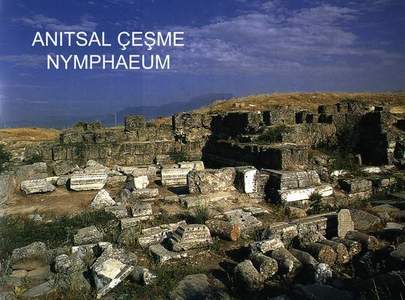
|
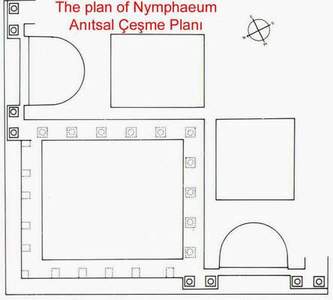 |
As is the case for other
locations, Christianity has affected the Jew community first.Existence of one of the
famous 7 churches of Small Asia in this city shows the importance of Christianity in this
city. We don't know the reason why Laodikeia that was established near Goncalı and
Eskihisar villages in archaic period was completely left. But, it is not difficult to
guess that big earthquakes had a role in this event. A very big earthquake that happened
in 194 AD has destroyed the city. |
Assembly
Building
It is in southwest of the city. The monumental building having a rectangular plan lies in
east - west direction. The main entrance is at the eastern side. It is constructed with
arch and vault system starting from the entrance. The upper parts of the building have
been destroyed completely and the bearer elements have been destroyed partially. |
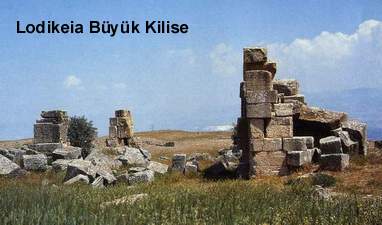
Laodicea Big Church
|
Church
It is constructed in the south of the street with columns, near the street. Only a part of
the bearer parts is not damaged. Its main entrance is in the western side. In the middle
part, eight pillars, four of which are arched and four of which are flat, have been used. |
Zeus Temple
It is in the eastern part of the street with columns of archaic Laodikeia city and between
the small theatre and nymphaeum. But only parts of the ornamental elements can be seen. |
Big Theatre
It is constructed in northeast of the archaic city, in Greek theatre type and in Roman
style in compliance with the area. Its scene is completely destroyed and its cavea and
orchestra is in good condition. It has a capacity of approximately 20.000 persons. Small Theatre
It is 300 m northwestern of the Big theatre. It is constructed in Roman style in
compliance with the area in Greek type. Its scene is completely destroyed and there are
damages in its cavea and orchestra. It has a capacity of approximately 15.000 persons. |
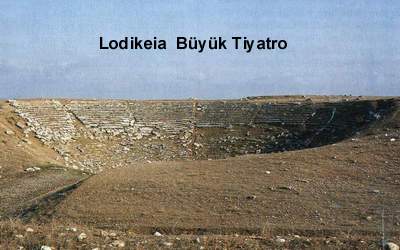
Laodicea Big Theatre
|
Stadium and Gymnasium
It lies in southwestern of the city in east - west direction. The additional buildings and
gymnasium are constructed so as to constitute a whole. The length of the stadium
constructed in 79 AD is 350 m and its width is 60 m. The building, which is constructed in
the form of a amphitheater has 24 - step sitting lines. A big part of it is destroyed. An
inscription indicating that the gymnasium has been had constructed in 2nd century AD by
proconsul Gargilius Antioius and devoted to Emperor Hadrianus and his wife Sabina.
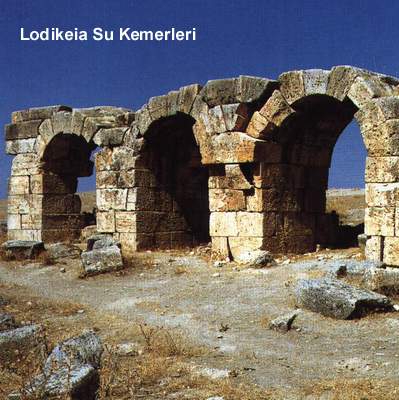
Laodicea Aqueduct
|
The city was founded on a
location geographically very convinient, south of the river Çürüksu (Lykos) According
to ancient sources, the city was founded between the years 261 and 253 BC by king
Antiochos II of Seleukos and name after his wife Laodicea. In the first and second
centuries ad, through commercial activity to be come a large money-lending centre and
experienced at me of prosperity the relics present here from Roman and Byzantine times
seen on the grid plan. Are two theatres, a stadium (for athletic contests) an odeon for
concerts and meetings, temples, a nymphaeuint, a temple for nyphs with Fountain and statue
a council building churcha. (This passage had been referenced from in front of
antic city explain board) |
|

